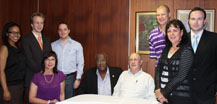Postgraduate School and Faculty of Law receive Rector during discussion with emerging researchers
 |
|
A session of the special programme for upcoming researchers was attended by, from the left: Denine Smit, Prof. Jonathan Jansen, Prof. Voet du Plessis of the Department of Mercantile Law and Marda Horn; back: Glancina Mokone, Albert Nell, Pieter Brits, Prof. Neil Roos, Director of the UFS’s Postgraduate School and Jamie Faber.
Photo: Leonie Bolleurs
11 September 2012
|
Prof. Jonathan Jansen, Vice-Chancellor and Rector of the university, recently addressed six Ph.D. students and their supervisors in the Faculty of Law as part of a special programme of the Postgraduate School for emerging researchers. Prof. Jansen contextualised his lecture on the impact and significance of research, “How do you determine that the important and bigger questions in your research are addressed to ensure the impact thereof?” in his discussion with the researchers. Based on the model of international postgraduate seminars, the researchers set out their field of study to Prof. Jansen and the audience. Suggestions were then made on how to increase the intellectual impact and theoretical depth of academic argumentation.
According to Prof. Neil Roos, Director of the Postgraduate School, together with Prof. Jackie du Toit and Prof. Corli Witthuhn, Academic Coordinators for the Vice Chancellor’s Prestige Scholar Programme, the aim of the programme is to provide support to emerging researchers on postgraduate level similar to the Prestige Scholar Programme.
“The initiative is being rolled out in a faculty-specific way. In consultation with the deans, the specific needs in the faculty are determined, which in turn determines the approach,” says Prof. Roos.
The six students are all involved at the university in various capacities, and are studying towards a Ph.D. in Law. They are outstanding candidates who are being funded by the Postgraduate School in order to empower postgraduate students to greater reach, internationalisation and the establishment of long-term academic networks. The programme is coordinated in the Faculty of Law by Prof. Loot Pretorius.
Two upcoming researchers in the Faculty of Theology and one in Nursing joined the group for Prof. Jansen’s lecture on significant research.